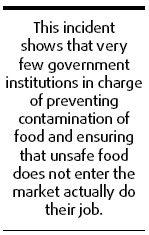Opinion
Another food scandal
(China Daily)
Updated: 2010-02-27 07:55
 |
Large Medium Small |
The discovery of pesticide-contaminated cowpea in Guangdong province, Wuhan city and other places has again sounded alarm bells over unsafe food. Recurring incidents of contaminated food such as milk, eggs and now edible plants have made a thorough overhaul of food inspection and quarantine system an absolute necessity.
Contaminated cowpea was first discovered in Wuhan, capital of Hubei province. The plant is grown on about 13,000 hectares in Hainan province and was sourced from there. Cities and towns in other provinces soon began reporting about cowpea contaminated by three types of poisonous pesticides, which can seriously harm consumers.
To prevent such incidents from recurring, it is necessary to find out why and how such contamination took place and who is to blame for that. And consumers need to know all the details of the case.
For example, they need to know why the three types of pesticides, which are banned, were sold to farmers. They should know who sold the pesticides and where did they get them in the first place when they were banned. They also need to know why the farmers were not told about the ban on the pesticides. The agricultural departments of county and township governments should have informed the farmers of the ban and ensured that the proscribed chemicals were not sold.

The role of agricultural product inspection and quarantine workers, who should have constituted the first wall of defense against unsafe food, should be investigated, too. It has been reported that Hainan has only one machine to test whether plants and vegetables are safe for human consumption. So it is quite likely that the contaminated cowpea was not tested before it was transported out of the province. But interestingly, 400 kg of cowpea was tested and cleared for sale in Nanjing, capital of Jiangsu province. But a second test showed the cowpeas were contaminated. The authorities have to find out why the first test for contamination was negative.
Just like in the melamine-contaminated milk and other food scares, this incident shows that very few government institutions in charge of preventing contamination of food and ensuring that unsafe food does not enter the market actually do their job.
This is a terrible situation. The head of the General Administration of Quality Supervision, Inspection and Quarantine was dismissed after the melamine-contaminated baby formula scandal in 2008. He was punished so that the next person in charge and officials at the local level would do their job properly.
But what is really needed is an overhauling of the entire system if quality inspectors and quarantine officials are expected do a good job and prevent contaminated food from being placed on our dinner tables. And the overhauling of the supervision and inspection system should start only after a thorough investigation into the latest incident food contamination.









